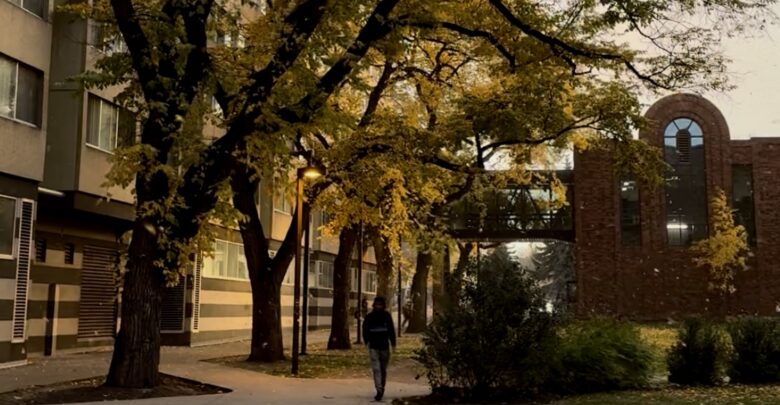Ask a prof: What should students know for this year’s cold and flu season?
U of A professor Dr. Lynora Saxinger addresses the challenges of containing and coping with viruses for post-secondary campuses and their students.
 Jasleen Mahindru
Jasleen MahindruThe beginning of autumn promises leaf-lined sidewalks, fresh pumpkin pie, and cozy nights with nothing but a cup of tea. Less exciting is the arrival of cold and flu season, and all the coughing, sneezing, and shivering that comes with it.
Like the rest of the world, post-secondary campuses are no stranger to viruses. Often, campuses are hit by the same illnesses spreading through the general population, Dr. Lynora Saxinger, a professor in the faculty of medicine and dentistry and an infectious diseases specialist, explained.
This includes respiratory diseases like COVID-19, human metapneumovirus, influenza, and respiratory syncytial virus (RSV). Norovirus, which is more often referred to as the stomach flu, can be an issue in close quarters, Dr. Saxinger added.
“That would be the one that tends to create havoc in close scenarios like cruise ships or dormitories. It’s highly, highly infectious, and so it can be a difficult one.”
Young people are also at a higher risk of contracting and spreading neisseria meningitis. Outbreaks have been known to occur in university settings, Dr. Saxinger explained.
The last outbreak in Edmonton was in the early 2000s, which Dr. Saxinger dealt with first hand as a fellow. If students are concerned about their symptoms or find themselves getting sick rapidly, Dr. Saxinger advised seeking care or letting someone know to check up on you.
Pressure to attend school while sick amongst challenges to containing viruses on campuses
When it comes to containing viruses on post-secondary campuses, Dr. Saxinger noted several challenges. For one, the pressures that students experience might cause them to “downplay symptoms and not stay out of class because it’s a high stakes situation.”
Additionally, contact tracing is more difficult due to the amount of “blending and mixing.”
“It’s not like you’re following a single cohort of people through a set schedule. There’s a lot of mixing and mingling,” Dr. Saxinger explained. “And if someone is infected, they might be in quite a few different spaces over the time period that they’re still infectious and are unaware that they’re exposing others.”
While some of the illnesses experienced during the cold and flu season have no vaccines, influenza does. Although Dr. Saxinger said that low uptake of the vaccine is an issue.
Poor ventilation is another challenge. The infrastructure at the U of A “varies a lot,” Dr. Saxinger noted, and ventilation standards are no different.
Dr. Saxinger emphasizes the importance of nutrition, rest, and staying home while ill
The occasional bout of sickness is a fact of life, but it is rarely convenient. Dr. Saxinger noted some ways students can best manage their health and the health of others when it comes to cold and flu season.
For one, proper nutrition and rest are beneficial for a shorter recovery time. However, students can struggle with this, Dr. Saxinger acknowledged.
“Those things sometimes go by the wayside for students, because it can become very, very debilitating just living your life without adding on a really miserable illness on top of it,” Dr. Saxinger said. “The problem is, that if you let yourself get ground down too much, it’s a lot harder to come back from.”
When symptoms do start to present themselves, Dr. Saxinger emphasized the importance of staying home. Not only to get rest but also to keep others from getting sick.
“If you are getting sick, make sure that you communicate with any of the educators that you need to. I think that should be supported by the university, that you don’t have to attend in-person when you’re sick.”
Dr. Saxinger noted that during the COVID-19 pandemic a lot of effort was put into figuring out remote learning and risk minimization for students. She expects “that there’s still an echo of that right now, where there should be support for people not coming in-person if they’re ill.”
“If you end up in a state of perpetual exhaustion, you’re not performing that well for the rest of the time either,” Dr. Saxinger says
Additionally, Dr. Saxinger spoke about normalizing masking and frequent hand washing. While both were commonly recommended practices during the COVID-19 pandemic, Dr. Saxinger thinks “people are starting to become self-conscious about some of these things.”
“We just had a worldwide pandemic and like seven [million] people died. I really do think it should be completely fine if people choose to do that, and it can offer them some benefit to do so.”
Lastly, Dr. Saxinger recommended avoiding overloading yourself so you can have an adequate time to recover when you do become ill. Rather than immediately returning to your normal level of activity, she suggests to under promise and over perform.
“People should make sure that they give themselves permission to rest and get better. In the long game that is important in terms of your overall studies. If you end up in a state of perpetual exhaustion, you’re not performing that well for the rest of the time either.”




